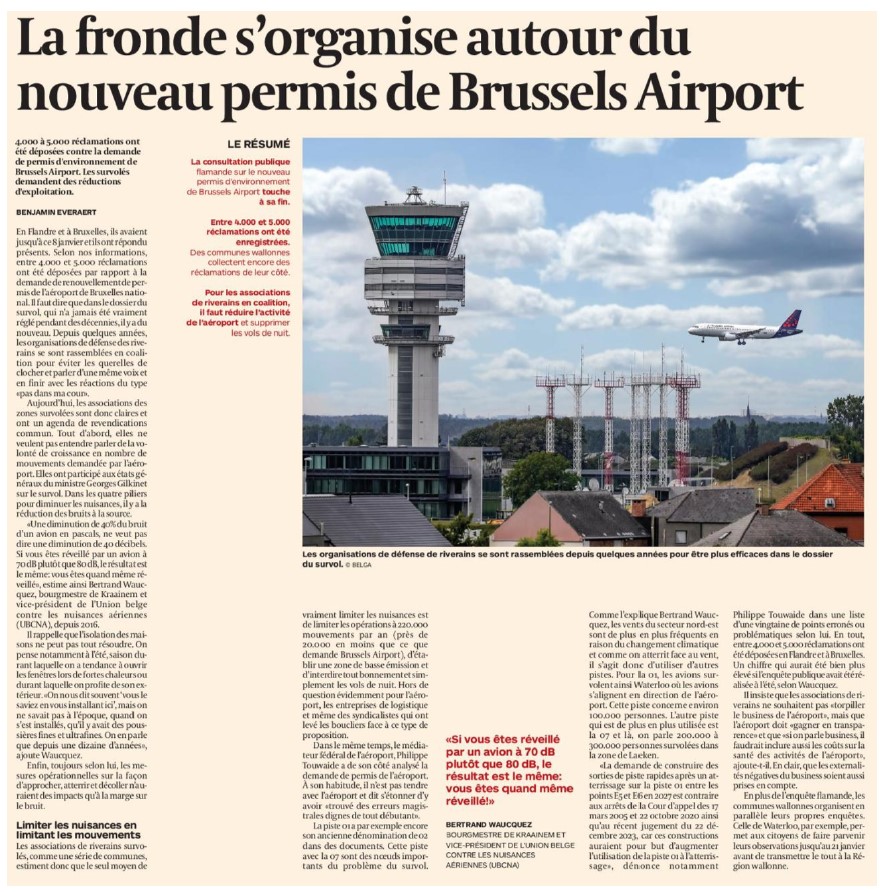L’Echo – 09.01.2024
Protest grows over Brussels Airport’s new permit

In Flanders and Brussels, they had until January 8 to respond. According to our information, between 4,000 and 5,000 complaints have been lodged in relation to Brussels Airport’s license renewal application.
There’s a new development in the overflight dossier, which has remained unresolved for decades. Over the past few years, local residents’ organizations have joined forces to avoid parochial quarrels and speak with one voice, putting an end to “not in my backyard” reactions.
“If you’re woken up by an airplane at 70 dB rather than 80 dB, the result is the same: you’re still awake!”
BERTRAND WAUCQUEZ
MAYOR OF KRAAINEM AND VICE-PRESIDENT OF THE BELGIAN UNION AGAINST AIR POLLUTION (UBCNA)
Today, the associations of the areas overflown are clear and have a common agenda of demands. Firstly, they don’t want to hear about the airport’s desire for growth in the number of movements.
“A 40% reduction in aircraft noise in pascals does not mean a reduction of 40 decibels. If you’re woken up by an aircraft at 70 dB rather than 80 dB, the result is the same: you’re still awake,” says Bertrand Waucquez, mayor of Kraainem and vice-president of the Union Belge Contre les Nuisances Aériennes (UBCNA), since 2016.
He reminds us that insulating houses can’t solve everything. We’re thinking in particular of summer, a season when we tend to open our windows in the heat or enjoy the outdoors. “We’re often told ‘you knew this when you moved here’, but we didn’t know at the time, when we moved in, that there was fine and ultrafine dust. We’ve only been talking about it for about ten years,” adds Waucquez.
Finally, in his opinion, operational measures on approach, landing and take-off would only have a marginal impact on noise.
Limit nuisance by restricting movements
Local residents’ associations, like a number of local authorities, believe that the only way to really limit nuisance is to limit operations to 220,000 movements per year (almost 20,000 less than Brussels Airport is asking for), establish a low-emission zone and simply ban night flights. Obviously out of the question for the airport, logistics companies and even trade unionists, who have thrown up their hands in protest at such a proposal.
Track 01
The 01 track, for example, still has its old name of 02 in some documents. This runway, along with 07, is a key part of the overflight problem. As Bertrand Waucquez explains, north-easterly winds are becoming more frequent due to climate change , and as we land into the wind, we have to use other runways.
“The request to build fast runway exits [… would aim to increase the use of runway 01 on landing.”
PHILIPPE TOUWAIDE
FEDERAL MEDIATOR FOR BRUSSELS-NATIONAL AIRPORT
For 01, the planes fly over Waterloo, where they line up on their way to the airport. This trail concerns around 100,000 people. The other runway that’s being used more and more is 07, and here we’re talking about 200,000 to 300,000 people overflown in the Laeken area.
“The request to build fast runway exits after landing on runway 01 between points E5 and E6 in 2027 is contrary to the Court of Appeal’s judgments of March 17, 2005 and October 22, 2020, as well as the recent judgment of December 22, 2023, as these constructions would be aimed at increasing the use of runway 01 for landing,” Philippe Touwaide denounces in particular in a list of some twenty points that he considers erroneous or problematic.
In all, between 4,000 and 5,000 complaints were lodged in Flanders and Brussels. A figure that would have been much higher if the public survey had been carried out in the summer, according to Waucquez.
“If we want to talk business, we also have to consider the health costs of the airport.”
BERTRAND WAUCQUEZ
MAYOR OF KRAAINEM AND VICE-PRESIDENT OF THE BELGIAN UNION AGAINST AIR POLLUTION (UBCNA)
He insists that the local residents’ associations do not wish to “torpedo the airport’s business”, but that the airport must “gain in transparency” and that “if we talk business, we should also include the health costs of the airport’s activities”, he adds. In other words, that the negative externalities of business are also taken into account.
In addition to the Flemish survey, the Walloon municipalities are organizing their own parallel surveys. The one in Waterloo, for example, allows citizens to send in their comments until January 21, before forwarding them to the Walloon Region.
___________________________________________________________________
The summary
-
The Flemish public consultation on Brussels Airport’s new environmental permit is drawing to a close.
-
Between 4,000 and 5,000 complaints were recorded. Some Walloon municipalities are still collecting complaints on their own.
-
For the local residents’ associations in coalition, the airport’s activity must be reduced and night flights eliminated.
-
The airport’s mediator, Philippe Touwaide, has drawn up a list of 20 errors and what he sees as problematic points in the airport’s proposal.

